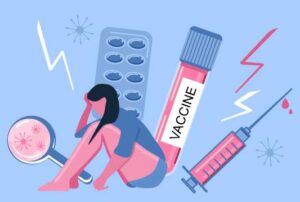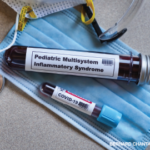 As more people get vaccinated for COVID-19, there’s hope that the long days of a pandemic, which has claimed more than 2.5 million lives globally and 500,000 in the U.S., will soon draw to a close and allow daily life to return to normal. However, for some people, this recovery may take longer, because the lingering symptoms of COVID-19 are making it difficult for them to return to the hale state of health they enjoyed prior to contracting SARS-CoV-2.
As more people get vaccinated for COVID-19, there’s hope that the long days of a pandemic, which has claimed more than 2.5 million lives globally and 500,000 in the U.S., will soon draw to a close and allow daily life to return to normal. However, for some people, this recovery may take longer, because the lingering symptoms of COVID-19 are making it difficult for them to return to the hale state of health they enjoyed prior to contracting SARS-CoV-2.
The nomenclature for these patients is evolving. Long-haulers is popular, as is people with long COVID. Whichever term is used, it’s now widely recognized that many people are emerging from SARS-CoV-2 infection with persistent symptoms, and these cases are being documented in a growing number of cohort studies.
Research Says …
In China, a large cohort study found 76% of patients hospitalized with COVID-19 in Wuhan between January and May 2020 had at least one ongoing symptom six months after acute infection.1
A 2021 cohort study from Ireland found 62% of patients—both those hospitalized for acute COVID-19 infection and those with milder disease—reported they didn’t feel back to full health at a median of 75 days after diagnosis. Forty-seven percent of these patients met the case definition for fatigue, independent of initial disease severity. Of the 48% of patients in the Irish study who required hospitalization for COVID-19, 4% had persistently abnormal chest X-rays.2
Other cohort studies are documenting prolonged symptoms in people with initial mild COVID-19.3,4
To better understand these numbers, a meta-analysis pooled data from multiple studies and found 80% of patients infected with SARS-CoV-2 developed one or more long-term symptoms.5 The analysis of 47,910 patients with a confirmed diagnosis of COVID-19 from 15 studies assessed symptoms, signs or laboratory parameters two weeks or more after viral infection (range: 14–100 days). The analysis included patients with all degrees of COVID-19 severity. Table 1 describes the most common symptoms reported.
Musculoskeletal symptoms are also emerging as a common persistent issue, as reported in a systematic review documenting an array of rheumatic and neuromuscular complications supported by multi-modal imaging. The review describes the range of persistent effects of COVID-19 on muscles, nerves, joints, soft tissue and bone found on imaging. The symptoms reported by patients included arm and leg weakness, pain, numbness, joint pain and swelling with restricted motion, and severe fatigue.6

Dr. Deshmukh
The study’s senior author, Swati Deshmukh, MD, assistant professor, Department of Radiology (Musculoskeletal), Northwestern University, Chicago, emphasizes the clinical implication of these findings and the increasing number of people experiencing and now living with persistent post-COVID-19 symptoms.
“Early in the pandemic, there was a focus on survival vs. death,” she says. “One year later, we need to come to terms with the fact that there are many people who have long-term medical conditions because of COVID-19. The healthcare system will need to address this new patient population, the so-called long-haulers who may require expertise from doctors of different specialties.”
To date, no one knows why some people develop persistent symptoms. But the pool of patients is growing, with a new study reporting that even patients who do not feel sick after testing positive for SARS-CoV-2 are developing long-term symptoms.7
The Needs of Long-Haulers
Post-COVID Care Centers are one way the healthcare system is addressing this new patient population. According to an NBC News report, more than 80 of these centers exist nationwide and at least 10,000 people have been seen in 64 of the centers surveyed.8 (View an interactive map with a list of these centers by state on Survivors Corps, a patient website.) These centers provide a multidisciplinary team approach to the evaluation and management of post-COVID patients with persistent symptoms.
Joan Bosco, MD, assistant professor, Department of Internal Medicine, Mount Sinai, N.Y., works in the Mount Sinai Center for Post-COVID Care, one of the first of these centers to open, in May 2020. She emphasizes how significant and scary these persistent symptoms can seem, particularly when they present in previously healthy young people.
“The most dramatic post-COVID presentation we are seeing is COVID fatigue, with symptoms indicative of a dysregulation of the autonomic nervous system that result in elevated heart rates and drops in blood pressure,” she says, adding the most severely affected patients have a hard time getting out of bed on some days.

Dr. Bosco
In the sample of 47 new patients she and her team saw in June/July 2020, Dr. Bosco says 24 had fatigue, 21 were short of breath, 17 had memory issues or cognitive impairment, 16 had neuropathy, 15 had anxiety or nightmares, and 11 had loss of smell or distorted taste. Although assessment of these patients initially included imaging studies and other laboratory tests, Dr. Bosco notes the center no longer routinely uses these tests because, for the most part, the tests came back normal.
“The center is still ordering extensive lab tests and imaging, but doctors are more discerning in what studies they order [because] many routine studies will be normal in a good percentage of these patients,” she says.
As of January 2021, Dr. Bosco says the center was seeing about 170 new patients per month. Each patient undergoes an initial evaluation and is then referred to whatever specialist within their network—or in the patient’s network, if different—that the symptoms warrant. Patients are asked to return at six months for a follow-up evaluation.
“The one thing that seems to be helping is physical therapy, but it’s a gradual process,” she says. “We have a post-rehab program with a special protocol for post-COVID-19 patients.”
Further information on clinical experience in providing post-acute COVID-19 care to patients with persistent symptoms can be found online in a January 2021 webinar sponsored by the Centers for Disease Control & Prevention.
Unique Role of Rheumatologists

Dr. Gaylis
As a rheumatologist practicing in South Florida, Norman Gaylis, MD, has been seeing patients with persistent symptoms of COVID-19 at Arthritis & Rheumatic Disease Specialties, Aventura, Fla., for over nine months—beginning well before wide recognition these patients existed.
He notes that early in the pandemic the clinic was proactive in testing patients to ensure they didn’t have COVID-19 prior to their clinical visits during which they were to receive biologic infusions. He and his colleagues noticed their patients were getting COVID-19 less than the population at large, as reported in a study presented at the ACR Convergence 2020.9
“Then, suddenly, we started seeing more patients,” he says, referring to patients coming after COVID-19 infection with persistent symptoms. “Suddenly, 30% of my new patient population are those related to COVID-19.”
Dr. Gaylis notes many of these patients are coming in with joint pain, muscle pain, fatigue, rashes and neuropathy—symptoms suggestive of an autoimmune disease. He thinks a big reason he’s seeing more of these patients—and why he thinks this may be true of more rheumatologists—is the experience rheumatologists have with biologic drugs, which he says can be used to dampen the symptoms experienced by long-haulers.
‘We need to come to terms with the fact that there are many people who have long-term medical conditions because of COVID-19,’ says Swati Deshmukh, MD.
“The familiarity we have with treating autoimmune diseases due to cytokine antibodies is what makes us the ideal specialists for patients coming in with a multiplicity of symptoms and manifestations,” he says. Rheumatologists, he adds, are used to figuring out what treatments to try for symptoms without a clear diagnosis based on a good understanding of disease and sometimes with the availability of information from laboratory tests showing immunologic abnormalities.
Dr. Gaylis compares treating the long-haulers he sees with treating patients with lupus or vasculitis. “There is no one way to treat these patients [because] any organ system can be involved, ranging from the gastrointestinal tract to cardiovascular system, to musculoskeletal or skin,” he says. “What you’re looking at is a jigsaw puzzle.”
Table 1: Most Common Persistent Post-COVID Symptoms
| Symptom (% of patients) | Description |
|---|---|
| Fatigue (58%) | Resemble symptoms seen in CFS patients, including severe incapacitating fatigue, pain, neurocognitive disability, compromised sleep, worsening symptoms with physical or mental exertion. |
| Neuropsychiatric symptoms; headache (44%), attention disorder (27%), anosmia (21%) | Brain fog and neuropathy also reported; anxiety disorders, insomnia and dementia are the most common psychiatric conditions that present post COVID-19. Adults are at double the risk of developing a newly diagnosed psychiatric disorder after COVID-19 diagnosis. |
| Dyspnea (24%) and cough (19%) | Abnormalities in CT lung scans persisted in 35% of patients up to 60–100 days after COVID-19. |
CFS, chronic fatigue syndrome; CT, computed tomography
Example: When he sees a long-hauler patient with joint pain, Dr. Gaylis assumes the pain is driven by one of the inflammatory cytokines that causes joint pain in his normal patient population. Therefore, he measures the patient’s cytokine levels and, if the tumor necrosis factor (TNF) alpha or interleukin (IL) 6 levels are high, he’ll suggest using a drug that blocks that cytokine.
“And that is pretty much how we’ve treated these patients,” he says.
Currently, Dr. Gaylis is recruiting patients to enroll in a U.S. Food & Drug Administration exploratory study to evaluate the safety and efficacy of a monoclonal antibody, leronlimab (NCT04347239). The drug blocks the C-C chemokine receptor type 5 (CCR5), a receptor responsible for immune and inflammatory responses.10
Data on response to blocking this receptor, says Dr. Gaylis, may shed light on other autoimmune diseases, such as chronic fatigue syndrome and fibromyalgia, that have long baffled rheumatologists and others.
“This may be a silver lining to COVID-19, if we can discover new treatments for diseases we’ve had a tough time treating,” he says.

Dr. Chang
Ann Marie Chang, MD, associate professor, emergency medicine, Jefferson University Hospitals, Philadelphia, also underscored that a better understanding of patients who experience persistent symptoms post-COVID-19 infection may help focus more attention on other conditions with similar long-term symptoms, such as chronic fatigue syndrome, for which a better understanding has long been needed.
Dr. Chang is leading efforts at Jefferson University to enroll patients in a U.S. National Institutes of Health study, the Innovative Support for Patients with SARS-CoV-2 Infections (COVID-19) Registry (INSPIRE), to better understand the range of persistent symptoms of long-haulers.11
As both a physician who has treated COVID-19 patients and someone with firsthand experience of persistent symptoms after recovering from acute COVID-19 infection in March 2020, Dr. Chang says she hopes the study will provide needed information on questions about why some patients develop these symptoms, how to treat those who do and how to prevent the onset of persistent symptoms.
“Right now, as a physician, it feels like riding a bike that we’re building at the same time—there is such a rapid reassessment of recommendations for a condition that we don’t necessarily know how to treat,” Dr. Chang said in a Feb. 10 press release.12
As someone who knows what it feels like to have a condition without a clear diagnosis and treatment, she stressed the need for clinicians to recognize the condition.
“For patients whose quality of life has been so severely impacted, it’s really scary to hear from their doctors that we just don’t know what to do for them, and we don’t know when their symptoms will end—is it a year, two years, lifelong? We just don’t know,” Dr. Chang said.12
Mary Beth Nierengarten is a freelance medical journalist based in Minneapolis.
More Research Underway
A new U.S. National Institutes of Health initiative is underway to better understand the many unknowns about long-term complications of SARS-CoV-2 infection. The Post-Acute Sequelae of SARS-CoV-2 Infection (PASC) Initiative and Investigator Consortium is seeking applications to support research on the long-term complications of SARS-CoV-2 infection. For more information click here.
Patient Resources
- Survivor Corps. Online resources for COVID-19 survivors, including national database of Post-COVID Care Centers (PCCC) by state
- Global Healthy Living Foundation’s Free COVID-19 Support Program for Chronic Disease Patients and Their Families
- Centers for Disease Control & Prevention’s Innovative Support for Patients with SARS-C0V-2 Infection Registry (INSPIRE):
- Body Politic’s COVID-19 support group
References
- Huang C, Huang L, Wang Y, et al. 6-month consequences of COVID-19 in patients discharged from hospital: A cohort study. The Lancet. 2021 Jan 16;397(10270):220–232.
- Townsend L, Dowds J, O’Brien K, et al. Persistent poor health post-COVID-19 is not associated with respiratory complications or initial disease severity. Ann Am Thorac Soc. 2021 Jan 8. Online ahead of print.
- Salmon-Ceron D, Slama D, De Broucker T, et al. Clinical, virological and imaging profile in patients with prolonged forms of COVID-19: A cross-sectional study. J Infect. 2021 Feb;82:e1–e4.
- Nehme M, Braillard O, Alcoba G, et al. COVID-19 symptoms: Longitudinal evolution and persistence in outpatient settings. Annals of Intern Med. 2020 Dec 8;M20–5926. Online ahead of print.
- Lopez-Leon S, Wegman-Ostrosky T. Perelman C, et al. More than 50 long-term effects of COVID-19: A systematic review and meta-analysis. MedRxiv preprint. 2021 Jan 30.
- Ramani SL, Samet J, Franz CK, et al. Musculoskeletal involvement of COVID-19: Review of imaging. Skeletal Radiol. 2021 Feb 18:1–11.
- Huang Y, Pinto MD, Borelli JL, et al. COVID symptoms, symptom clusters and predictors for becoming a long-hauler: Looking for clarity in the haze of the pandemic. medRxiv. 2021 Mar 5;2021.03.03.21252086. Preprint.
- Edwards E. Inside ‘post-COVID’ clinics: How specialized centers are trying to treat long-haulers. NBC News. 2021 Mar 1.
- Strosser JK, Yglesias R, Gaylis N, et al. Low incidence of coronavirus disease 2019 (COVID-19) infection in patients on biologic infusion therapies at a community rheumatology practice [abstract: 0435]. Arthritis Rheumatol. 2020 Oct;72(suppl 10).
- CytoDyn Inc. Study to evaluate the efficacy and safety of leronlimab for patients with severe or critical coronavirus disease 2019 (COVID-19) [NCT04347239]. CinicalTrials.gov. 2020 Nov 16.
- Hota B, Rush University Medical Center. Innovative support for patients with SARS-COV2 infections (COVID-19) registry (INSPIRE) [NCT04610515]. CinicalTrials.gov. 2021 Feb 24.
- Thomas Jefferson University. Investigating the long-term effects of COVID-19. Newswise. 2021 Feb 10.



